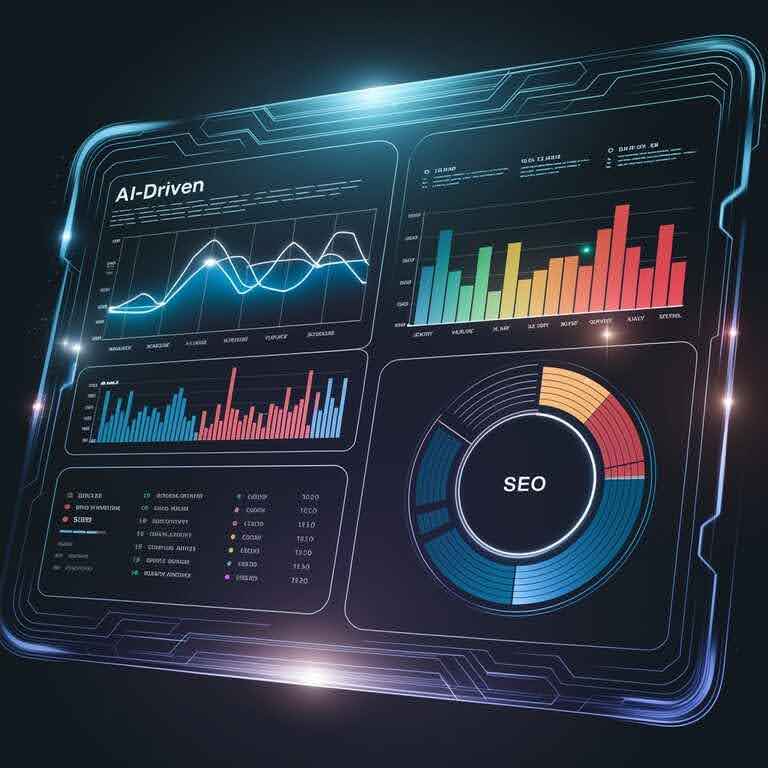AI for SaaS product page optimization refers to using artificial intelligence and machine learning technologies to enhance the performance, visibility, and conversion rate of SaaS product pages. By leveraging AI, businesses can improve their on-page SEO, personalize user experiences, and optimize content dynamically to align with search engine algorithms and user intent.

Why AI is Transforming SaaS Product Page SEO and UX
Integrating AI into SaaS product page optimization revolutionizes how businesses approach SEO and user experience (UX). AI enhances these areas by:
- Automating SEO Tasks: AI-driven tools can generate meta descriptions, optimize images, and suggest internal linking strategies.
- Enhancing Personalization: AI-powered dynamic content adapts to individual user preferences, increasing engagement.
- Improving Conversion Rates: AI-driven A/B testing and predictive analytics allow businesses to refine their product pages for better performance.
- Optimizing Search Visibility: AI uses real-time data to help identify and implement the most effective keywords and content strategies.
How AI Differs from Traditional Optimization Methods
Feature | Traditional Optimization | AI-Powered Optimization |
Keyword Research | Manual selection based on experience | AI-driven analysis of trends and search intent |
Content Creation | Human-generated with SEO considerations | AI-assisted content creation optimized for search engines |
Personalization | Static content for all users | Dynamic content adapting to user behavior |
A/B Testing | Manual setup and monitoring | AI-powered real-time testing and optimization |
Technical SEO | Manual audits and fixes | AI-based automation and predictive error detection |
Understanding the Role of AI in SaaS Product Page Optimization
AI and Search Engine Algorithms
How AI Shapes Google’s Ranking Factors
Search engines like Google use AI, particularly machine learning models like RankBrain and BERT, to determine search rankings. These AI models assess factors such as:
- User Intent: AI helps search engines understand what users mean, even with ambiguous queries.
- Content Relevance: AI evaluates how well content matches search queries based on semantic analysis.
- User Engagement Metrics: Search engines analyze bounce rates, dwell time, and click-through rates to refine rankings.
The Role of Natural Language Processing (NLP) in SEO
Natural Language Processing (NLP) enables AI to understand and optimize content based on human-like language comprehension. Benefits of NLP in SaaS SEO include:
- Enhanced Keyword Optimization: AI suggests semantically related keywords for broader coverage.
- Better Content Structuring: NLP helps format text for readability and relevance.
- Improved User Intent Matching: AI refines search query responses by predicting user needs more accurately.
AI-Driven Personalization and Its Impact on SaaS SEO
AI enables SaaS companies to personalize product pages dynamically, leading to:
- Higher Engagement: Users are more likely to interact with tailored content.
- Lower Bounce Rates: Personalized recommendations keep users on-site longer.
- Improved Conversion Rates: AI-driven personalization leads to higher sign-ups and demo requests.
AI-Powered Keyword Research and Intent Analysis
Identifying High-Converting Keywords with AI
AI-powered keyword tools analyze vast amounts of data to identify the most valuable keywords based on the following:
- Search Volume: AI predicts which keywords are trending in the SaaS industry.
- Competition Level: AI evaluates keyword difficulty and suggests alternatives.
- User Intent Alignment: AI ensures selected keywords match potential customers’ needs.
Using AI for Competitive Keyword Gap Analysis
AI-driven tools like Ahrefs and SEMrush analyze competitor rankings to identify keyword opportunities. Key benefits include:
- Finding Untapped Keywords: AI discovers keywords competitors have overlooked.
- Assessing Competitor Strengths: AI compares ranking positions and backlinks.
- Optimizing for SERP Features: AI identifies opportunities to rank in featured snippets and answer boxes.
Understanding User Search Intent with Machine Learning
Machine learning helps classify search intent into categories:
Intent Type | Example Queries | AI Optimization Strategy |
Informational | “What is SaaS SEO?” | AI-generated educational content, blogs, FAQs |
Navigational | “HubSpot pricing page” | AI-optimized site structure and internal linking |
Transactional | “Best SaaS SEO tools” | AI-personalized landing pages with strong CTAs |
Commercial | “Ahrefs vs. SEMrush comparison” | AI-driven competitor analysis content |

AI-Enhanced On-Page SEO for SaaS Product Pages
AI-Driven Content Optimization
Using AI to Generate and Improve Product Page Copy
AI tools like ChatGPT, Jasper, and Copy.ai transform how SaaS companies create content. These tools help generate:
- Compelling headlines that attract clicks.
- Persuasive product descriptions that highlight key features.
- Benefit-driven bullet points to make scanning easy.
- SEO-friendly meta descriptions that boost CTR.
AI doesn’t replace human creativity. Instead, it enhances it by providing data-driven recommendations. Marketers can fine-tune AI-generated content to match brand voice and customer needs.
Structuring Content for SEO and Readability
People scan, not read. AI helps format content for maximum impact by:
- Suggesting shorter sentences and paragraphs for better readability.
- Recommending bullet points and numbered lists to break up text.
- Ensuring proper use of headers (H1, H2, H3) for SEO clarity.
- Optimizing for featured snippets by answering key questions concisely.
AI-Powered Meta Tags, Headers, and Schema Markup
AI tools like Clearscope and SurferSEO analyze top-ranking pages to suggest:
- SEO-friendly title tags that match search intent.
- Optimized headers (H1, H2, H3) for keyword placement.
- Schema markup to enhance rich snippets in search results.
Adding structured data like FAQs, star ratings, and pricing details helps SaaS product pages stand out in Google results.
AI and Visual Content Optimization
AI-Generated Product Images and Videos for Engagement
Images and videos are essential for conversion. AI tools like Canva and Synthesia:
- Generate custom visuals that align with brand aesthetics.
- Create AI-powered explainer videos to simplify complex SaaS features.
- Enhance images for clarity and faster load times using AI compression.
Image Recognition and Alt Text Optimization with AI
Search engines rely on alt text to understand images. AI tools like Google Vision API analyze visuals and suggest:
- Descriptive alt text to improve accessibility and SEO.
- Relevant image file names for better rankings.
- Optimized image sizes for faster page loading.
Enhancing User Experience with AI-Based Interactive Elements
AI makes SaaS product pages more engaging by enabling the following:
- AI-powered chatbots that answer user questions in real time.
- Interactive product demos that adapt to user preferences.
- Personalized call-to-action (CTA) buttons based on browsing behavior.
These features keep users engaged and increase conversions.
AI-Optimized Internal Linking Strategies
Dynamic Internal Linking for Better Navigation
AI tools like Link Whisper automate internal linking by:
- Suggesting contextual links based on content relevance.
- Preventing broken links and orphan pages.
- Ensuring strategic link placement for an SEO boost.
AI-Powered Contextual Link Suggestions
AI analyzes user behavior and suggests personalized internal links to:
- Guide visitors to relevant product features.
- Encourage exploration of case studies and testimonials.
- Improve dwell time and lower bounce rates.
This keeps users engaged and helps search engines understand site structure better.
AI for Conversion Rate Optimization (CRO) on SaaS Product Pages
AI and A/B Testing for Product Pages
AI-Driven Variant Testing for Higher Conversions
Traditional A/B testing takes time. AI speeds up the process by:
- Running multiple test variations simultaneously.
- Predicting winning designs and copy faster.
- Adjusting tests in real-time based on data.
AI platforms like Optimizely and VWO analyze performance metrics and optimize pages continuously.
Predictive Analytics for Understanding User Behavior
AI tracks user behavior and predicts:
- Which CTA placements drive the most sign-ups?
- What headline variations increase click-through rates?
- How color changes impact conversion rates.
This data helps SaaS companies make informed design decisions.
AI-Powered Personalization and User Experience (UX)
Dynamic Content Personalization Based on User Data
AI personalizes SaaS product pages by:
- Displaying customized messaging based on user intent.
- Recommending tailored features based on past interactions.
- Adjusting pricing options based on user demographics.
This makes the experience more relevant and engaging.
AI Chatbots for Real-Time Engagement and Lead Capture
AI-powered chatbots like Drift and Intercom help by:
- Answering common pre-sale questions instantly.
- Qualifying leads and collecting user information.
- Offering personalized onboarding guidance.
Chatbots reduce friction and guide users through the decision-making process.
Intelligent Recommendations and AI-Driven Product Demos
AI analyzes visitor behavior to suggest:
- Related SaaS features based on their browsing history.
- Interactive demos tailored to user needs.
- Custom pricing plans based on company size and use case.
This level of personalization increases conversions and customer satisfaction.
AI-Optimized Call-to-Action (CTA) Strategies
AI-Generated CTAs Based on User Intent
Not all users respond to the same CTAs. AI analyzes:
- Whether users prefer “Get a Free Trial” vs. “Schedule a Demo”.
- The best CTA placement and size for engagement.
- The most effective wording and color schemes.
Predictive Modeling for CTA Placement and Design
AI tools use heatmaps and clickstream analysis to:
- Identify hotspots for CTA buttons.
- Adjust CTA size and contrast for better visibility.
- Test CTA wording variations in real time.
This ensures that CTAs are optimized for conversions.

AI-Driven Technical SEO for SaaS Product Pages
AI-Powered Site Speed Optimization
Site speed affects both SEO and user experience. A slow page increases bounce rates and lowers conversions. AI helps optimize speed by:
- Analyzing performance issues and suggesting fixes.
- Predicting load times based on different devices and locations.
- Automating optimizations like caching and script management.
How AI Enhances Load Times and Performance
AI tools like Google PageSpeed Insights and NitroPack automatically:
- Compress images without losing quality.
- Minify JavaScript, CSS, and HTML for faster rendering.
- Implement lazy loading to delay non-essential content.
AI-Based Image Compression and Lazy Loading
Images make SaaS product pages visually appealing but can slow them down. AI tools like TinyPNG and Cloudinary:
- Auto-compress images without affecting quality.
- Detect and optimize large files automatically.
- Implement lazy loading so images load only when needed.
AI for Mobile Optimization
Google prioritizes mobile-first indexing. If your SaaS product page isn’t mobile-friendly, rankings and conversions suffer.
AI-Based Responsive Design Adjustments
AI tools analyze user interactions and adjust designs dynamically by:
- Optimizing layouts for different screen sizes.
- Detecting touch gestures and improving navigation.
- Rearranging elements for better readability on small screens.
AI-Driven Voice Search Optimization
Voice search is growing. Users now search with conversational phrases like:
- “What’s the best project management SaaS?”
- “Show me affordable email marketing tools.”
AI tools optimize for voice search by:
- Identifying long-tail, natural-language keywords.
- Structuring content in a question-and-answer format.
- Enhancing schema markup for voice search visibility.
AI-Powered Structured Data Implementation
Structured data helps search engines understand content better. It also improves search result visibility with rich snippets.
Automating Schema Markup with AI Tools
AI tools like Merkle’s Schema Generator and Schema App:
- Auto-generate structured data for SaaS product pages.
- Optimize for Google’s rich results (pricing, reviews, FAQs).
- Detect missing schema to improve rankings.
Using AI to Optimize Rich Snippets and Featured Snippets
AI analyzes search trends and suggests:
- FAQ schema to appear in Google’s “People Also Ask” section.
- Review schema to display star ratings in search results.
- How-to schema for step-by-step guides.
This boosts visibility and attracts more organic clicks.
AI-Enhanced Off-Page SEO Strategies for SaaS Product Pages
AI and Link Building Strategies
Backlinks remain a major ranking factor. AI makes link-building more innovative and more efficient.
Identifying High-Quality Backlink Opportunities with AI
AI tools like Ahrefs and Moz analyze:
- Competitor backlinks to find relevant sources.
- Authority scores to target high-quality links.
- Broken link opportunities for easy wins.
AI-Based Outreach and Content Syndication
AI helps streamline outreach efforts by:
- Finding contact information of relevant website owners.
- Generating personalized email pitches using NLP.
- Suggesting syndication opportunities for SaaS blogs.
Automating these tasks saves time and increases success rates.
AI-Driven PR and Brand Mentions
Getting featured in online publications and blogs boosts credibility. AI helps track and enhance PR efforts.
Monitoring Brand Mentions with AI Sentiment Analysis
AI tools like Brandwatch and Mention:
- Scan the web for brand mentions in real-time.
- Analyze sentiment (positive, neutral, negative).
- Identify PR opportunities based on trends.
Leveraging AI for Digital PR and Media Outreach
AI identifies:
- Journalists and influencers writing about SaaS topics.
- Trending industry discussions for PR opportunities.
- The best times to pitch stories for maximum exposure.
This makes PR campaigns more data-driven and effective.
AI for Social Media and SaaS SEO
Social signals may not be direct ranking factors, but they influence brand visibility and engagement.
AI-Driven Social Listening and Trend Analysis
AI tracks:
- Trending hashtags and keywords in SaaS discussions.
- Competitor social media strategies for inspiration.
- Audience sentiment to refine messaging.
Automating Social Sharing for SEO Impact
AI-powered tools like Buffer and Hootsuite:
- Schedule social media posts at optimal times.
- Analyze post engagement to refine content.
- Suggest captions and hashtags for better reach.
By automating social strategy, SaaS companies drive more traffic to their product pages.

AI-Driven Analytics and Performance Tracking for SaaS Product Pages
AI-Powered SEO Metrics and Reporting
AI simplifies analytics by providing real-time insights and predictive data.
Predictive SEO Analysis for Future Trends
AI forecasts:
- Keyword ranking trends based on algorithm changes.
- User behavior shifts that affect conversions.
- Competitive threats in search rankings.
AI-Based Keyword Ranking and Traffic Predictions
AI tools analyze:
- Which keywords will gain traction in the coming months?
- How search volume is shifting for core topics.
- Traffic projections based on ranking improvements.
This helps SaaS companies stay ahead of SEO trends.
AI for Heatmaps and User Interaction Analysis
AI heatmaps track where users click, scroll, and drop off.
Tracking User Behavior with AI Heatmaps
Tools like Hotjar and Crazy Egg:
- Identify high-engagement areas on the page.
- Detect friction points that cause drop-offs.
- Suggest design changes to improve navigation.
AI-Powered Clickstream Analysis for UX Improvements
AI analyzes:
- User navigation patterns to optimize page flow.
- Conversion bottlenecks and suggests fixes.
- Session recordings to visualize user interactions.
These insights enhance both SEO and CRO.
AI and Automated SEO Audits
AI removes the guesswork from SEO audits.
Identifying and Fixing SEO Issues with AI
AI-powered audit tools like Screaming Frog and Sitebulb:
- Scan websites for broken links and fix them automatically.
- Detect duplicate content and recommend rewrites.
- Analyze Core Web Vitals for better performance.
Continuous Optimization Through AI Recommendations
AI provides:
- Automated reports with prioritized SEO fixes.
- Real-time alerts for indexing and ranking issues.
- Ongoing recommendations to maintain top rankings.
This ensures SaaS product pages stay optimized at all times.
Challenges and Limitations of AI in SaaS SEO
AI is powerful, but it’s not perfect. SaaS companies must understand its limitations to use it effectively.
Potential Pitfalls of AI-Generated Content
AI speeds up content creation, but it comes with risks.
Risk of Low-Quality or Over-Optimized Content
AI can generate keyword-heavy content that sounds robotic. This can:
- It hurt the user experience.
- Trigger Google’s spam filters.
- Reduce engagement and conversions.
To fix this, always human-edit AI-generated content. Ensure it’s natural, engaging, and aligned with the brand voice.
Balancing AI Automation with Human Creativity
AI can’t replace human storytelling. It lacks:
- Emotional intelligence is needed for a persuasive copy.
- Unique insights that set a brand apart.
- Brand-specific tone without detailed customization.
The best approach is to use AI as a tool, not a replacement, and have humans refine and personalize AI output.
AI and Algorithm Updates: Staying Adaptive
Google’s algorithms constantly evolve. AI tools analyze trends, but they don’t always predict updates accurately.
How AI Handles Google Core Updates
AI SEO tools track:
- Keyword ranking fluctuations.
- Changes in SERP features.
- New content ranking patterns.
However, they can’t always predict algorithm shifts. Marketers should stay informed manually and adjust strategies accordingly.
Avoiding Over-Reliance on AI Predictions
AI models work with past data. They can:
- Identify historical patterns.
- Make educated guesses on ranking factors.
But they can’t foresee Google’s next move with certainty. Human expertise remains essential.
Ethical Considerations in AI-Driven SEO
Using AI in SEO raises ethical questions.
Avoiding AI-Generated Spam and Manipulative Tactics
Some marketers use AI to:
- Mass-produce thin, low-value content.
- Generate fake reviews or auto-generated testimonials.
- Overuse AI-generated backlinks.
Google penalizes these tactics. Always use AI responsibly.
Transparency and Authenticity in AI Content
Users value authenticity. If AI writes content, businesses should:
- Disclose AI usage where appropriate.
- Ensure AI-generated content aligns with human values.
- Prioritize user experience over SEO tricks.
Brands focusing on authentic, valuable content will win in the long run.

Future Trends in AI for SaaS SEO
AI and SEO continue to evolve. Here’s what’s next.
Advancements in AI-Powered Search Algorithms
Google is getting smarter. AI-driven algorithms will:
- Understand intent better. Search will rely more on natural language processing (NLP).
- Prioritize user experience signals. Bounce rate, dwell time, and engagement will matter more.
- Detect AI-generated content. Search engines will reward well-structured, human-validated content.
How SaaS Companies Can Stay Ahead
To stay competitive:
- Focus on real value, not just rankings.
- Use AI to enhance content, not replace human creativity.
- Keep up with Google’s AI-driven updates.
Evolving Role of AI in Content Personalization
AI-driven personalization will transform SaaS marketing.
Hyper-Personalized SEO Strategies
AI will tailor content based on:
- User behavior and preferences.
- Industry and company size.
- Past interactions with a product page.
Search engines may start ranking personalized search results higher.
AI-Driven Dynamic Content for SaaS Product Pages
Future AI will:
- Adapt page layouts based on user intent.
- Customize messaging in real-time.
- Serve different content to different users automatically.
Personalized pages will boost engagement and conversion rates.
Voice Search and AI-Driven Conversational Queries
Voice search is changing SEO. AI-driven assistants like Siri and Google Assistant are becoming more advanced.
How AI Enhances Voice Search Optimization
AI will:
- Improve natural language processing (NLP).
- Focus more on question-based searches.
- Rank concise, conversational answers higher.
Optimizing for the Future of Conversational Search
To stay ahead, SaaS companies should:
- Use conversational keywords.
- Optimize for FAQ-style snippets.
- Structure content in short, direct answers.
As AI improves, voice search will dominate local and SaaS-related queries.
Breaking It All Down
AI is reshaping how SaaS companies optimize for search engines. It enhances:
- On-page SEO (content, structure, internal linking).
- Off-page SEO (link building, brand mentions, social signals).
- Technical SEO (speed, mobile optimization, structured data).
- Conversion rate optimization (personalized CTAs, A/B testing).
The Key to Success: AI + Human Expertise
AI is a powerful assistant, but human strategy remains crucial. The best approach is to:
- Use AI to automate data-driven tasks.
- Let human creativity refine messaging and brand voice.
- Stay agile and adapt to Google’s evolving algorithms.
SaaS companies that balance AI efficiency with human expertise will dominate search rankings and conversions.
Frequently Asked Questions
How does AI help SaaS companies identify content gaps in their SEO strategy?
AI tools analyze competitor content, search trends, and user queries to highlight missing topics or underperforming keywords. This helps SaaS companies create more relevant, high-ranking content.
Can AI improve internal linking strategies for SaaS product pages?
AI can suggest internal links based on keyword relevance, user behavior, and SEO best practices. It ensures better navigation, effectively distributes link equity and enhances page authority.
How can SaaS companies use AI to optimize their call-to-action (CTA) placements?
AI-driven heatmaps and A/B testing tools analyze user behavior to determine the best placement, color, wording, and design of CTAs, maximizing conversions on product pages.
Does AI help improve accessibility on SaaS product pages?
Absolutely. AI-powered tools can automate alt text generation, improve color contrast, and ensure screen reader compatibility, making SaaS product pages more accessible to all users.
Can AI assist with competitor analysis for SaaS SEO?
Yes, AI-powered SEO tools track competitor rankings, backlink profiles, content performance, and keyword strategies, providing insights into how to outperform competitors in search results.
How does AI impact A/B testing for SaaS landing pages?
AI speeds up A/B testing by quickly analyzing vast amounts of user data, identifying winning variations faster, and suggesting new test ideas based on real-time performance insights.
What role does AI play in reducing bounce rates on SaaS product pages?
AI helps personalize content, improve page load speeds, enhance readability, and optimize UX, all of which keep visitors engaged and reduce bounce rates.
Is AI helpful in multilingual SEO for SaaS companies targeting global markets?
AI-powered translation and localization tools can optimize SaaS product pages for different languages and cultural contexts, improving search rankings in international markets.
Can AI predict which SEO tactics will be most effective for a SaaS business?
AI uses predictive analytics to forecast keyword trends, user behavior shifts, and search engine algorithm changes, helping SaaS companies stay ahead with data-driven SEO strategies.
How does AI help manage SEO for large SaaS websites with multiple product pages?
AI automates large-scale SEO tasks like metadata generation, duplicate content detection, and site structure analysis, making SEO for complex SaaS websites easier to manage.
What are some AI-powered tools SaaS companies can use for SEO automation?
Popular AI SEO tools include SurferSEO (content optimization), Clearscope (keyword research), MarketMuse (content strategy), and Frase (AI-driven content briefs).
Can AI help recover from a Google penalty affecting a SaaS product page?
AI tools can diagnose SEO issues, identify unnatural backlinks, and analyze content compliance with Google’s guidelines, helping SaaS companies make necessary corrections to recover rankings.
How does AI contribute to lead generation for SaaS companies beyond SEO?
AI enhances chatbots, personalized email marketing, predictive lead scoring, and behavioral targeting, all of which contribute to converting organic search visitors into leads.
What's the best way to integrate AI into an existing SaaS SEO strategy?
Start with AI-powered keyword research, automate repetitive SEO tasks, leverage AI-driven content optimization, and use AI analytics to refine strategies based on data insights.
Offsite Resources For You
Moz – A trusted source for SEO guides, keyword research tools, and insights on Google algorithm updates.
Ahrefs – Offers powerful tools for backlink analysis, competitor research, and keyword tracking to improve SaaS SEO strategies.
Search Engine Journal – Provides up-to-date news, in-depth articles, and expert insights on AI, SEO, and digital marketing trends.
Neil Patel – Features SEO training, AI-driven marketing tips, and SaaS growth strategies to optimize product pages effectively.
HubSpot Blog – Covers content marketing, SEO, and AI-driven personalization tactics for SaaS companies.
SEMrush – A comprehensive SEO platform with AI-powered tools for competitive analysis, keyword research, and content optimization.
Content Marketing Institute – Offers strategies on AI-enhanced content marketing, SaaS SEO best practices, and organic lead generation.

What's Next?
A quick reminder for small business owners: The SEO tips provided on this page were shared by our co-founder, Matt LaClear. Since 2009, Matt has worked on over 13,277 SEO campaigns for clients, making him an expert in optimizing websites for better performance and visibility.
Don’t miss out on his special offer — a free custom SEO strategy call! Take advantage of this opportunity to get personalized advice tailored to your business and improve your website’s SEO.

